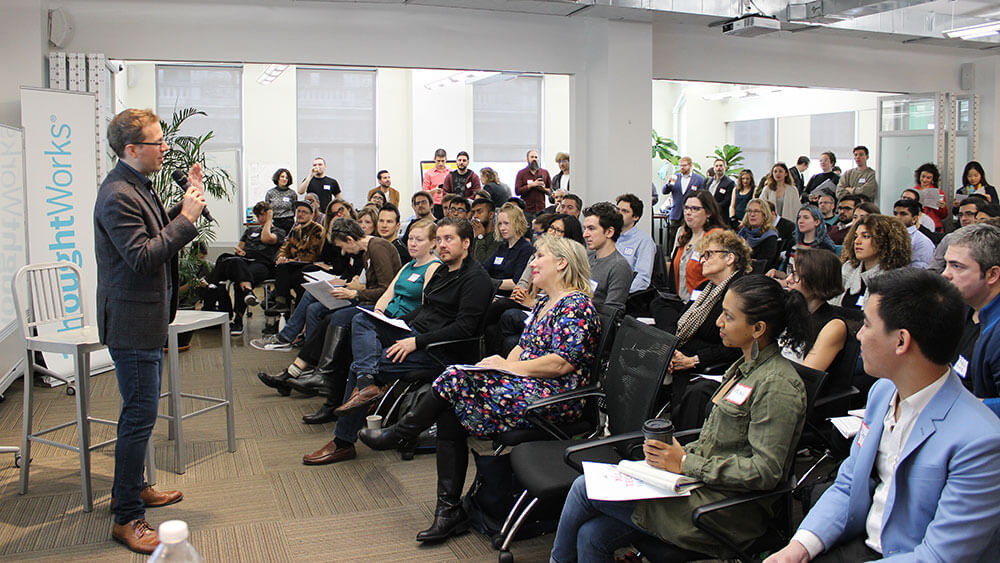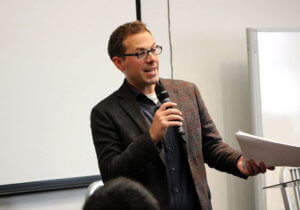
David Ryan Polgar speaks at the first All Tech is Human summit, which convened people from a variety of backgrounds to discuss ethical tech development.
David Ryan Polgar is a former attorney and college professor turned tech writer, global speaker, and regular media commentator on tech ethics, digital citizenship, and tech balance/digital wellness. He created and co-hosts Funny as Tech, a bi-monthly live panel show and weekly podcast tackling thorny tech issues. He recently launched All Tech Is Human — described as “a hub for the thoughtful tech movement” — and on Oct. 20, 2018, hosted the inaugural All Tech Is Human: A Summit on Ethical Tech in New York City. Four more events on technology and ethics are slated for this year throughout the U.S. In addition, Polgar has developed a digital citizenship class for adults and a tech ethics hub for college students.
And yet, despite this breadth of background, even he didn’t plan for the best way to reconcile data collection and ethics when setting up the All Tech Is Human conference registration process. “I didn’t add anything [to the registration form] that said, ‘Hey, check this box if you would like [to receive] certain information,’” Polgar said, which would have given him permission “to notify others who might want to talk to you, which would be good for networking.”
That’s the kind of question that should always be an opt-in, Polgar said, not an opt-out. “But if you don’t ask that and aren’t transparent about that, then it’d be unsavory to then just spread that information. A couple days before the event, I did have a few people reaching out to say, ‘Can you tell me everyone else who is going to attend?’” Unfortunately, he had to decline, letting those who asked know that he couldn’t hand over registrants’ emails because he hadn’t explicitly received their permission to do so.
While GDPR has made organizers more aware of data privacy issues, Polgar said that transparency is even more important. The tech ethicist — and conference organizer — discussed how to approach each step in the attendee journey with full disclosure.
‘The 21st-Century Oil’
Sharing attendee details with other attendees is one thing — selling their information to suppliers is another.
“Users are starting to be savvier,” Polgar said. They’re recognizing that their data is valuable — “it’s the 21st-century oil,” he said. Being open about what you plan to do with attendee data is critical, but in his experience, not a regular practice in the events industry. “I’ve gone to certain events, and then I’ve gotten bombarded by emails,” he said, which made it clear that the event host “had put me on some list and sold my information.”
It’s not that Polgar is opposed to the sharing or selling of information — events are a business that needs to be financed, he said. But attendees need to be told that “by signing up for this, you’ll probably get five emails from businesses that fund these activities,” he said, “and reduced your ticket cost, or something like that. The more open you can be about why this is being done, then I think, you’re in clear waters.”
Polgar says it’s not “practical” to bury details about how you may capture and distribute attendee information in the fine print. “There was even a study a few ago,” he said, in which “98 percent of people who signed up for a fake social network [agreed to] give away their first-born child. In other words, absolutely no one reads terms of service. Lawyers don’t read terms of service. So, to that point, for any kind of event organizer, they really want to not focus on privacy as much as transparency. The key part that people have been upset about is not necessarily giving away data. It’s the unfair exchange of data and privacy. It’s typically where they feel misled.”

David Ryan Polgar speaks at the All Tech Is Human conference.
Marketing Your Event
Ethical questions start to crop up in the way you entice people to register for an event, Polgar said. “I guess what a lot of website designers consider, especially for events, is how to funnel somebody in. How do you take somebody from interest to purchase, right?”
What needs to be considered, he said, is if you, at any point, are being “less than forthcoming about the decision that the user needs to make. Are we hiding something in order to make it frictionless? If the answer to that is no, then everything is perfectly fine. Again, it’s just all about assuming that both sides — how we think about any type of contract — have equal access to knowledge and that they’re able to reach an agreement, because that’s really what’s happening with any kind of event. It’s like, ‘Here’s the offer.’ And then, you’re allowing the user to accept that offer that’s being made online. And in order to make this acceptance, there needs to be access to the information and to the knowledge.”
The effort to provide a friction-free online experience shouldn’t be at odds with transparency, Polgar said. And even though planners may worry that a pop-up notification about how attendees’ information will be used might scare some registrants away, he thinks that people are okay with that — and, in fact, they expect more of an opportunity to reflect during their online experience.
“This is what’s happening with technology,” he said. “We put blinders on when we’re trying to do something. I like to say that technologists see a problem, and they create a solution. Whereas, the tech ethicist says, ‘Well, what are the problems created from the solution?’ Even when you’re designing a website, you’re saying, ‘Okay, how do I get somebody interested, and then funnel them, so they hit the little purchase button, and then, they’re confirmed. And then, they go through their Google calendar. And then, I know they’re going to show up.’ Whereas, you would also need to say, ‘Let me think as if I am the user, and I’m going through this process. What would I want to know in order to make this a fair exchange?’”
End Results
Good events, Polgar said, “are going to thrive. And the bad events, people will say online what they think about them. So, I think that’s had a powerful effect on tilting us toward our better angels. So even though, theoretically, an event planner can be less than fully transparent to get somebody to sign up, the downside is that could adversely affect their reputation.”
If people feel “bamboozled,” he said, meaning that the event didn’t deliver on its promises or used their information without their permission, they will share that on social media. “Attendees have a lot of power in informing future prospective attendees. So obviously, event planners need to be cognizant of how important their online reputation is going to be to the longevity of the events that they’re planning.”
A Greater Level of Collaboration
At the inaugural All Tech Is Human summit, attendees came from as far away as Europe, and from such prestigious institutions as the United Nations. But what impressed David Ryan Polgar the most was the significant number of college students in the audience.
“A lot of them would come up to me and say, ‘Hey, I’m a dual major in computer science and philosophy,’” he said, and they asked, “‘How do I get involved?’ What I’m excited and optimistic about is that Gen Z is acutely aware of these issues, and they’re thinking a lot broader about them.”
All Tech Is Human attracted 175 attendees, mostly through word of mouth via Polgar’s networks. With “actual marketing,” he said, he could foresee attendance growing to 500 or even 1,000 people. But he doesn’t want the event to get so big that it loses its “intimate environment,” he said, where people are able to make “a lot of connections.” Because one of his “key takeaways” from the summit, he said, “is that in order to really tackle these thorny issues, we’re going to need a greater level of collaboration.”
‘There Weren’t a Lot of People Asking Deeper Questions’
As far back as 2012, David Ryan Polgar said, as an attorney and professor, “everything that I was speaking and writing about was really colored by how social media and emerging technology was changing how we live, love, learn, and even die. It’s really affecting the human condition. What I really found was that there was a lack of thoughtfulness around the topic. There weren’t a lot of people asking deeper questions.”
The media, he found, didn’t know what to make of him. When he spoke about tech, people would get “confused, because the only box that they had was a gadget guy. They wanted to bring somebody on [to a news show] to say what’s in the newest iPhone, to tell them about the features. Whereas, I was looking at, okay, how does this phone affect how you and I interact? Does it have an impact on our face-to-face communication? Does it alter the way that people date? How does it affect how we form friendships?”
Polgar quickly realized that it “was a no-brainer for educators and attorneys and philosophers and psychologists to get involved with technology, because it’s how we interact. It’s how we communicate,” he said. “Technology is not technology. Technology is society, right?”
Polgar founded All Tech is Human as “a multidisciplinary, multi-stakeholder, collaborative hub where we’re trying to co-create a more thoughtful future towards technology, [tackling] issues such as regulating speech online,” he said. ”This is a watershed moment, where you’re going to need a lot of different folks to get involved.”
Michelle Russell is Convene’s editor in chief.
